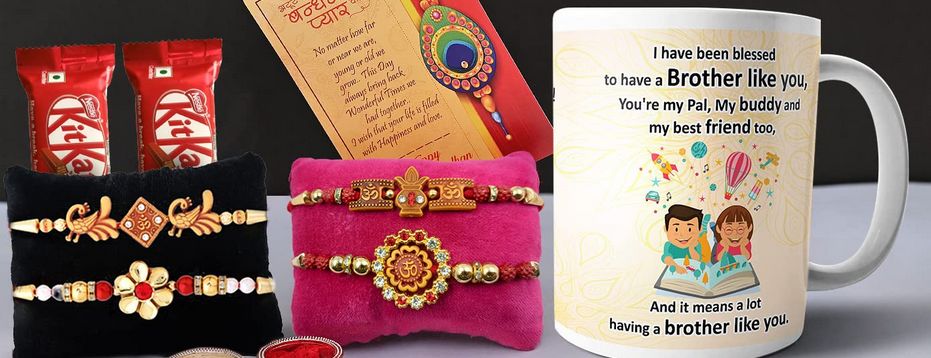Eco-Friendly Rakhi & Toy Rakhi: Embracing Sustainability and Tradition
Raksha Bandhan, a joyous festival celebrated in India, honors the sacred bond between brothers and sisters. Traditionally, sisters tie a sacred thread, known as a Rakhi, on their brothers' wrists, symbolizing their love and protection. Over time, the celebration of Raksha Bandhan has evolved, and in recent years, there has been a growing consciousness about the environment and sustainability. As a result, eco-friendly Rakhi and Toy Rakhi have emerged as popular alternatives, combining the essence of tradition with a commitment to protecting the planet.
Eco-Friendly Rakhi: Reducing the Footprint
The conventional Rakhi is often made from non-biodegradable materials like plastic, synthetic threads, and metals, leading to environmental pollution. However, eco-friendly Rakhi is crafted from sustainable materials that have a minimal impact on the environment.
- Biodegradable Materials: Eco-friendly Rakhi is usually made from biodegradable materials such as organic cotton, jute, bamboo, or recycled paper. These materials decompose naturally, reducing the burden on landfills and marine ecosystems.
- Natural Dyes: Toxic chemical dyes used in traditional Rakhis can leach into the soil and water bodies, harming the environment. Eco-friendly Rakhis use natural dyes made from plants, flowers, or vegetables, ensuring a safer and greener celebration.
- Seeds and Plantable Rakhis: Some eco-conscious individuals opt for plantable Rakhis that contain seeds of flowering plants or herbs. After the festivities, these Rakhis can be planted, allowing the bond of love to grow into beautiful plants.
- Handcrafted Artistry: Eco-friendly Rakhis often promote the work of local artisans who create these Rakhis with love and skill. Supporting such artisans not only preserves traditional craftsmanship but also helps in their economic empowerment.
Toy Rakhi: Adding Playfulness to Tradition
In recent years, Toy Rakhis have gained popularity as an innovative way to celebrate Raksha Bandhan, especially among young children. These Rakhis come with small, detachable toys, doubling the joy of the occasion.
- Reusability: Unlike traditional Rakhis that are worn for a day and discarded, Toy Rakhis can be cherished for a longer time. The detachable toy can be a keepsake, reminding siblings of their bond long after the festivities are over.
- Educational Value: Toy Rakhis often feature characters from popular stories or symbols of cultural significance. These toys can serve as educational tools, teaching children about their heritage, mythology, and history.
- Reducing Waste: By choosing Toy Rakhis, families can contribute to reducing waste, as the toy can be kept and enjoyed, rather than adding to the waste stream like single-use Rakhis.
Balancing Tradition and Sustainability
The shift towards eco-friendly Rakhi and Toy Rakhi reflects a growing awareness of the need to preserve our environment and embrace sustainable practices while honoring cultural traditions. Celebrating Raksha Bandhan with these alternatives not only benefits the planet but also fosters a sense of responsibility towards nature in the younger generation.
- Educating the Younger Generation: By introducing children to eco-friendly Rakhis and explaining the importance of sustainable choices, we can instill in them a sense of environmental stewardship from a young age.
- Setting an Example: Choosing eco-friendly options for Raksha Bandhan sets an example for other festivals and celebrations. It encourages people to seek sustainable alternatives in various aspects of their lives.
- Supporting Local Initiatives: Opting for eco-friendly Rakhis supports local artisans and businesses that are dedicated to sustainable practices. This not only boosts the economy but also helps preserve traditional crafts and knowledge.
In conclusion, the shift towards eco-friendly Rakhi and Toy Rakhi signifies the harmonious convergence of tradition and sustainability. It demonstrates that celebrating cultural festivals can go hand in hand with caring for the environment. By choosing these greener alternatives, we reaffirm our commitment to protecting the planet while treasuring the precious bond between siblings during Raksha Bandhan. Let this festival of love be an inspiration for a more sustainable and mindful way of life.


Share:
Rakhi chocolate gift hampers by Craft Vatika
Rakhi with Mugs: A Heartwarming Gesture of Love and Affection